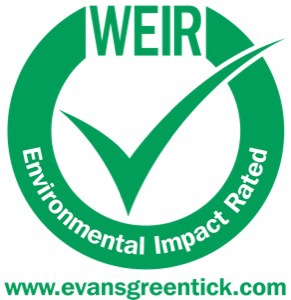

|
Chris Shaw
Editor |
| Home> | FACILITIES MANAGEMENT | >Chemicals & Dosing | >Evans Vanodine’s low impact product sales reach almost a third |
| Home> | SUSTAINABILITY | >Green Cleaning Products | >Evans Vanodine’s low impact product sales reach almost a third |
Evans Vanodine’s low impact product sales reach almost a third
07 October 2014
As manufacturers of cleaning and hygiene products Evans Vanodine is committed to developing chemicals which provide optimum performance with a minimal effect on the environment.

Each product within the Evans Vanodine range is analysed and scored under its W.E.I.R. system, a unique, environmental impact rating scheme developed by one of Evans’ research chemists, which takes into account 7 different criteria throughout the production process.
The lower the overall score, the lower the impact it has on the environment. Products which achieve a low impact rating show a green tick logo on their label.
Over the past year, sales of the ‘Green Tick’ range have been monitored and Evans is pleased to announce that its low impact products now account for 29% of UK Sales.
Evans Vanodine firmly believes that, rather than simply using any product labelled as ‘green’, it is important to select a product that is fit for its purpose, used at the recommended dilution rate and disposed of responsibly. Using an apparently low impact product to carry out a cleaning task in the wrong circumstances does not serve the interest of the environment.
To help users choose the lowest impact product most appropriate for the application, the ‘Green Tick’ range is organised into categories, to cover a variety of soiling and water conditions.
- Foaming hand washes
- Evans product launch in support of children’s charity
- Optimum performance, minimum impact
- New formulation disinfectant kills bacteria in 30 seconds
- New coronavirus effective products
- Halal certified products
- Assured virucidal disinfection
- New and improved site to see
- A new chapter for the Evans Vanodine brand
- Super concentrate range





















